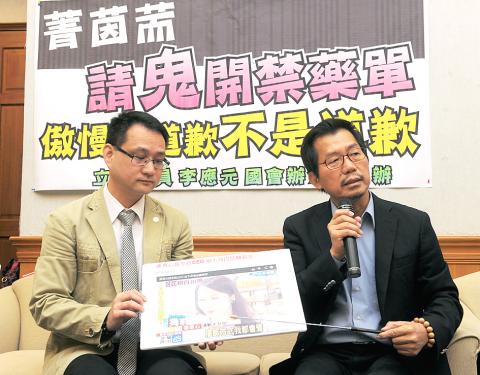Former vice president Lien Chan (連戰) yesterday defended his daughter Lien Hui-hsin’s (連惠心) investment in a nutrition supplement company whose weight-loss pills were found to contain unauthorized drugs, and said there may be political influence behind the investigation into the company.
Lien Hui-hsin on Sunday admitted she had invested in Geneherbs Biotechnology Co (菁茵荋生物科技). She had previously denied any involvement in the management of the firm.
Controversies over her promotion of the company’s products arose after Taipei City’s Department of Health confirmed that the firm’s weight-loss product — Wellslim Plus+ — contained cetilistat, a lipase inhibitor designed to treat obesity.

Photo: CNA
Lien Chan, a former Chinese Nationalist Party (KMT) chairman, said he has absolute confidence in his daughter and her handling of the situation, and said she will resolve the dispute with sincerity and well-thought consideration.
“As a citizen, I am against any food product or drug that damages public health. However, I also do not want to see any improper force influence the authorities’ handling of the case,” he said in response to reporters’ questions.
He added that he did not exclude the possibility that the case was being politically manipulated, but he did not elaborate.
He said he took Wellslim Plus+ and was “still very healthy.”
Democratic Progressive Party (DPP) Taipei City Councilor Juan Chao-hsiung (阮昭雄) first raised questions about the pills, and the city’s health department later reported the company to prosecutors after confirming that the pills contained unauthorized drugs.
Taipei Mayor Hau Lung-bin (郝龍斌) yesterday said public figures or celebrities should be more cautious about advertising products. He also said the city government would help consumers who had purchased the pills seek compensation from the company.
Hau said his close friendship with Lien Chan and his family would not impact the city’s handling of the matter.
Meanwhile, Premier Jiang Yi-huah (江宜樺) denied that political influence had been a factor in the investigation into the content of Wellslim Plus+.
“At least I was not involved in the controversy... And I believe that the local prosecutors’ office will investigate the case fairly,” Jiang said in response to a question from DPP Legislator Chen Chi-mai (陳其邁) during a question-and-answer session at the legislature.
While saying she was a shareholder in the company, Lien Hui-hsin on Sunday questioned the timing of the probe as well as the extensive media coverage, saying that political influence could be a factor.
There have been rumors that relationship between the Lien family and President Ma Ying-jeou (馬英九) has soured because of Ma’s perceived passiveness toward further investigations into the shooting of former Taipei EasyCard Corp chairman Sean Lien (連勝文) during a campaign rally in November 2010 as well as the election-eve shooting of then-president Chen Shui-bian (陳水扁) and then-vice president Annette Lu (呂秀蓮) on March 19 2004, who were running against Lien Chan and People First Party Chairman James Soong (宋楚瑜).
Sean Lien is regarded as a popular candidate for next year’s Taipei mayoral election, although he has not said whether he is interested in running.
Additional reporting by staff writer

CHAOS: Iranians took to the streets playing celebratory music after reports of Khamenei’s death on Saturday, while mourners also gathered in Tehran yesterday Iranian Supreme Leader Ayatollah Ali Khamenei was killed in a major attack on Iran launched by Israel and the US, throwing the future of the Islamic republic into doubt and raising the risk of regional instability. Iranian state television and the state-run IRNA news agency announced the 86-year-old’s death early yesterday. US President Donald Trump said it gave Iranians their “greatest chance” to “take back” their country. The announcements came after a joint US and Israeli aerial bombardment that targeted Iranian military and governmental sites. Trump said the “heavy and pinpoint bombing” would continue through the week or as long

TRUST: The KMT said it respected the US’ timing and considerations, and hoped it would continue to honor its commitments to helping Taiwan bolster its defenses and deterrence US President Donald Trump is delaying a multibillion-dollar arms sale to Taiwan to ensure his visit to Beijing is successful, a New York Times report said. The weapons sales package has stalled in the US Department of State, the report said, citing US officials it did not identify. The White House has told agencies not to push forward ahead of Trump’s meeting with Chinese President Xi Jinping (習近平), it said. The two last month held a phone call to discuss trade and geopolitical flashpoints ahead of the summit. Xi raised the Taiwan issue and urged the US to handle arms sales to

State-run CPC Corp, Taiwan (CPC, 台灣中油) yesterday said that it had confirmed on Saturday night with its liquefied natural gas (LNG) and crude oil suppliers that shipments are proceeding as scheduled and that domestic supplies remain unaffected. The CPC yesterday announced the gasoline and diesel prices will rise by NT$0.2 and NT$0.4 per liter, respectively, starting Monday, citing Middle East tensions and blizzards in the eastern United States. CPC also iterated it has been reducing the proportion of crude oil imports from the Middle East and diversifying its supply sources in the past few years in response to geopolitical risks, expanding

Pro-democracy media tycoon Jimmy Lai’s (黎智英) fraud conviction and prison sentence were yesterday overturned by a Hong Kong court, in a surprise legal decision that comes soon after Lai was jailed for 20 years on a separate national security charge. Judges Jeremy Poon (潘兆初), Anthea Pang (彭寶琴) and Derek Pang (彭偉昌) said in the judgement that they allowed the appeal from Lai, and another defendant in the case, to proceed, as a lower court judge had “erred.” “The Court of Appeal gave them leave to appeal against their conviction, allowed their appeals, quashed the convictions and set aside the sentences,” the judges